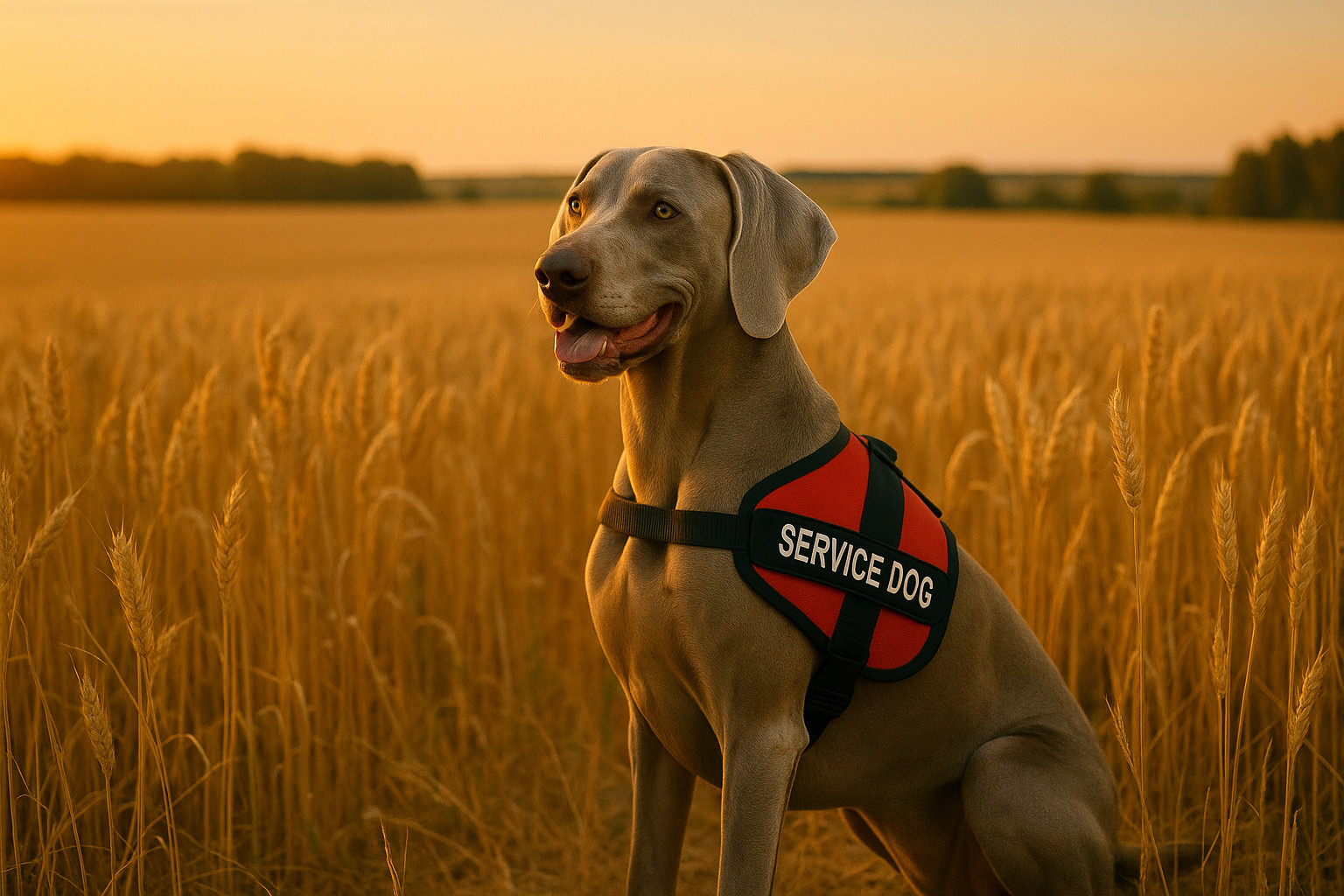Weimaraner as a Service Dog
Get Your Documents

Service dogs are invaluable companions to individuals living with physical, psychiatric, and emotional challenges. While many breeds are traditionally suited for service work, the Weimaraner, known for its striking appearance and energetic nature, is considered by some as a candidate for specific service roles. This article provides an in-depth analysis of the Weimaraner breed, focusing on its potential as a service dog.
Weimaraner Overview
Known for their sleek, muscular bodies and striking silver-gray coats, Weimaraners are members of the sporting group originally bred for hunting large game. Their origins date back to early 19th-century Germany, where they were prized as noble hunting companions. Although they are primarily known as hunting dogs, their intelligence, loyalty, and energy suggest a potential for service work in the right circumstances.
Physical Characteristics
Weimaraners are larger dogs with a strong, athletic build, typically standing 23 to 27 inches in height and weighing between 55 to 90 pounds. Their physical prowess is characterized by:
- Strength and Agility: Their well-defined muscles and stamina make them suitable for physically demanding tasks.
- Size and Reach: They can be useful in mobility assistance due to their height and ability to perform tasks that require reaching objects at a height.
- Endurance: Bred for stamina, they excel in performing tasks that require prolonged energy and activity.
While their size and strength can be advantageous, these traits also demand a handler capable of managing their energetic nature, which may not be suitable for all individuals requiring service animals.
Temperament and Attitude
The Weimaraner temperament is shaped by its hunting lineage, characterized by intelligence, loyalty, and a strong prey drive. Important aspects of their behavior include:
- Intelligence and Trainability: They are quick learners, often grasping complex tasks and commands efficiently, which is critical for service work. However, their intelligence requires consistent mental stimulation to prevent boredom.
- Loyalty and Bonding: Weimaraners form strong bonds with their handlers, displaying protective and attentive attitudes, ideal for providing emotional support.
- Energy Levels: Their high energy and curiosity can be challenging in public or controlled environments unless properly trained.
Despite these traits, their natural curiosity and high energy require rigorous training and management to ensure they are focused and obedient.
Types of Service Work
The suitability of Weimaraners for service work depends largely on their temperament and physical prowess. They are best suited for certain types of service roles, including:
- Mobility Assistance: Their strength and reach allow them to assist individuals with mobility challenges, such as retrieving items or providing balance support.
- Search and Rescue: Their keen sense of smell and endurance make them effective in search and rescue operations, although this is not typically classified as traditional service dog work.
- Psychiatric Support: Their loyalty and deep bonding capacity are beneficial for individuals with PTSD or anxiety, providing comfort and grounding in stressful situations.
While they can adapt to various roles, Weimaraners might not be ideal for service tasks requiring prolonged periods of inactivity or environments that demand low energy interaction.
Health Considerations
Weimaraners, like all breeds, have specific health considerations that may impact their capacity for service work:
- Hip Dysplasia: A common concern in larger breeds that can affect mobility and capacity to perform physically demanding tasks.
- Bloat (Gastric Torsion): This life-threatening condition requires immediate attention and careful management of feeding schedules and exercise.
- Separation Anxiety: Often arising from their tendency to bond closely with handlers, which can lead to behavioral issues if not addressed.
Being proactive in health check-ups and maintaining a healthy lifestyle can mitigate these risks, ensuring longevity and efficiency in service roles.
Training and Suitability
Training Weimaraners for service work requires commitment, patience, and expertise due to their intelligent yet independent nature. Aspects of their trainability include:
- Responsive to Positive Reinforcement: They perform best with reward-based training, where positive outcomes are emphasized.
- Focus and Consistency Challenges: Due to their high energy and curiosity, consistent and structured training schedules are crucial for success.
- Professional Training: Given their complex temperament, professional service dog trainers are recommended to ensure their behavior is suited to service work.
While capable of learning complex tasks, their potential for distraction requires an experienced handler committed to ongoing training and development.
Summary of Weimaraner
In summary, Weimaraners possess several attributes that can be advantageous in specific service roles, primarily those involving mobility and psychiatric support. However, their suitability is largely dependent on the handler’s ability to manage their energy and temperament through rigorous training and care. Key strengths and weaknesses include:
**
- Strengths:
- Strong, athletic build suitable for mobility tasks
- Intelligent and capable of learning complex commands
- Strong loyalty and bonding, beneficial for psychiatric support
- Weaknesses:
- High energy levels require rigorous training and experienced handling
- Susceptible to specific health issues like hip dysplasia and bloat
- Potential for separation anxiety if not managed appropriately
- Ideal Service Roles:
- Mobility Assistance
- Search and Rescue (non-traditional service work)
- Psychiatric Support
**
Despite these considerations, the Weimaraner’s unique characteristics make them a potential candidate for individuals looking for specific qualities in a service dog. With proper care, training, and commitment, the Weimaraner can fulfill roles in service work, making a profound impact on their handler’s quality of life.
Get Your Documents
Example State Cards













